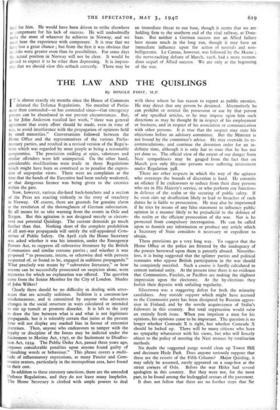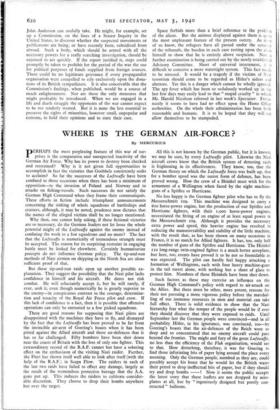THE LAW AND THE QUISLINGS
By DINGLE FOOT, M.P.
I T is almost exactly six months since the House of Commons debated the Defence Regulations. No member of Parlia- ment then contended—or has contended since—that emergency powers can be abandoned in our present circumstances. But, as Sir John Anderson recalled last week, "there was general agreement that every effort should be made, even in time of war, to avoid interference with the propagation of opinions held by small minorities." Conversations followed between the Home Office and the representatives of the various Parlia- mentary parties, and resulted in a revised version of the Regu'A- tions which was regarded by most people as being a reasonable compromise. The provisions striking at spies, saboteurs and similar offenders were left unimpaired. On the other hand, considerable modifications were made in those Regulations which might have been so construed as to penalise the expres- sion of unpopular views. There were no complaints at the time that the hands of the Executive had been unduly weakened, or that dangerous licence was being given to the enemies within the gate.
Now, however, various die-hard back-benchers and a section of the Press are reacting violently to the story of treachery in Norway. Of course, there are grounds for genuine alarm at the revelation of the thoroughness of German subornation. By all means let us take warning from the events in Oslo and Bergen. But this agitation is not designed merely to circum- vent our potential Quislings. The current demands go much further than that. Nothing short of the complete prohibition of all anti-war propaganda will satisfy the self-appointed Cem- mittee of Public Safety. On April 25th the Home Secretary was asked whether it was his intention, under the Emergency Powers Act, to suppress all subversive literature by the British Communists and similar extreme parties; and whether it was proposed "to prosecute, intern, or otherwise deal with persons suspected of, or found to be, engaged in seditious propaganda." What precisely was meant by "subversive literature," or how anyone can be successfully prosecuted on suspicion alone, were mysteries for which no explanation was offered. The question came from the Senior Member for the City of London. Shades of John Wilkes !
Clearly there should be no difficulty in dealing with utter- ances that are actually seditious. Sedition is a common-law misdemeanour, and is committed by anyone who advocates changes in the social structure in ways calculated or intended to stir up tumult or promote disorder. It is left to the jury to draw the line between what is and what is not legitimate propaganda, but it is tolerably certain that juries at the present tune will not display any marked bias in favour of extremist doctrines. Then, anyone who endeavours to tamper with the loyalty or discipline of the forces may be indicted under the Incitement to Mutiny Act, 1797, or the Incitement to Disaffec- tion Act, 1934. The Public Order Act, passed three years ago, Imposes considerable penalties upon anyone found guilty of insulting words or behaviour." This phrase covers a multi- tude of inflammatory expressions, as many Fascist and Com- munist orators, particularly in the metropolitan area, have found to their cost.
In addition to these statutory sanctions, there are the amended Defence Regulations, and they do not leave many loopholes. The Home Secretary is clothed with ample powers to deal with those whom he has reason to regard as public enemies. He may direct that any person be detained. Alternatively he can prohibit or restrict the possession or use by that person of any specified articles, or he may impose upon him such directions as may be thought fit in respect of his employment or business, and in respect of his association or communication with other persons. It is true that the suspect may state his objections before an advisory committee. But the Minister is not bound by the committee's advice. He may override its re- commendations, and continue the detention order for an in- definite time, although it is only fair to state that he has not yet done so. The official view of the extent of our danger from Nazi sympathisers may be gauged from the fact that on March 31st only fifty-one persons were suffering internment under Regulation 39B.
There are other respects in which the way of the agitator who oversteps the bounds of discretion is hard. He commits an offence if he endeavours to seduce from their duty persons who are in His Majesty's service, or who perform any functions in defence of the realm or the securing of public safety. If he even stirs up disaffection likely to lead to bteaches of such duties he is liable to prosecution. He may also be imprisoned if he tiles by means of any false statement to influence public opinion in a manner likely to be prejudicial to the defence of the realm or the efficient prosecution of the war. Nor is he protected from compulsory interrogation. He can be called upon to furnish any information or produce any article which a Secretary of State considers it necessary or expedient to obtain.
These provisions go a very long way. To suggest that the Home Office or the police are fettered by the inadequacy of the powers bestowed upon them is patently absurd. Neverthe- less, it is being suggested that the splinter parties and political remnants who oppose British participation in the war should be completely muzzled. Such a course is hardly calculated to cement national unity. At the present time there is no evidence that Communists, Fascists, or Pacifists are making the slightest impression upon the electorate. At the by-elections they forfeit their deposits with unfailing regularity.
Silvertown was a staggering defeat for both the minority candidates. Any outside support which might have accrued to the Communist party has been dissipated by Russian aggres- sion in Finland, and by the servile acquiescence of Stalin's followers in this country. But total suppression would raise an entirely fresh issue. When you imprison a man for his opinions, his opinions cease to be important. The question is no longer whether Comrade X is right, but whether Comrade X should be locked up. There will be many citizens who have no sympathy whatsoever with his views, but who will fiercely object to the policy of meeting the Nazi menace by totalitarian methods.
No doubt the suggested purge would clean up Tower Hill and decimate Hyde Park. Does anyone seriously suppose that these are the resorts of the Fifth Column? Major Quisling, it may safely be assumed, rarely appeared on a soap-box at the street corners of Oslo. Before the war Hitler had several apologists in this country. But they were not, for the most part, to be found among the bedraggled orators of the pavement.
It does not follow that there are no further steps that Sir John Anderson can usefully take. He might, for example, set up a Commission, on the lines of a Senate Inquiry in the United States, to discover whether the suspected movements or publications are being, or have recently been, subsidised from abroad. Such a body, which should be armed with all the necessary powers for a really searching investigation, should be enjoined to act quickly. If the report justified it, steps could promptly be taken to prohibit for the period of the war the use for political purposes of funds supplied from foreign sources. There could be no legitimate grievance if every propagandist organisation were compelled to rely exclusively upon the dona- tions of its British sympathisers. It is also conceivable that the Commission's findings, when published, would be a source of much enlightenment. Nor are these the only measures that might profitably be introduced. When we are engaged in a life and death struggle the opponents of the war cannot expect to be too tenderly treated. But it is none the less essential to preserve the rights of minorities, however small, unpopular and extreme, to hold their opinions and to state their case. Space forbids more than a brief reference to the probh.ni of the aliens. But the animus displayed against them is quite the most unpleasant feature of the present outcry. As n-
ct
of us know, the refugees have all passed under the scrui of the tribunals, the burden in each case resting upon the ai,_n himself to show, that he is entirely above suspicion. Nov a further examination is being carried out by the newly established Advisory Committee. Short of universal internment, it is difficult to conceive a more watertight system. This fact ne, to be stressed. It would be a tragedy if the victims of N terrorism should come to be regarded as Hitler's aiders and abettors. Yet this is a danger which cannot be wholly ignored. The spy fever which has been so sedulously worked up in the last few days may easily lead to that "stupid cruelty" to which Mr. Harold Nicolson referred in last week's Spectator. Fortu- nately it seems to have had no effect upon the Home Office authorities. On the whole their administration has been both reasonable and humane. It is to be hoped that they will not allow themselves to be stampeded.



































 Previous page
Previous page